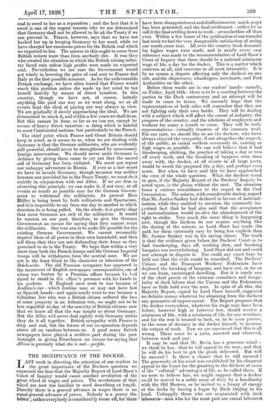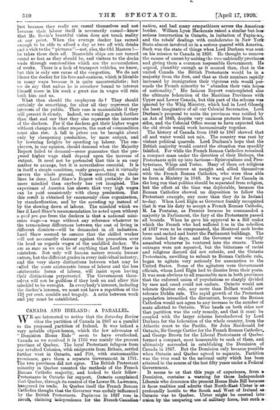THE SIGNIFICANCE OF THE DOCKER. T . AST week in directing
the attention of our readers to 4 the great importance of the Dockers question we expressed the fear that the Majority Report of Lord Shaw's Court of Inquiry would cause another revolution of the great wheel of wages and prices. The revolutions of that wheel are now too familiar to need describing at length. Directly there is a general advance in wages there is an equal general advance of prices. Nobody is a .penny the better ; rather, everybody is consideraPy worse off, for there have been disappointment and disillusionment, much anger has been generated, and the final settlement—rather let us call it the final settling down to work—seems further off than ever. Within a few hours of the publication of our remarks last week we had the very disagreeable satisfaction of seeing our words come true. All over the country fresh demands for higher wages were made, and in nearly every case reference was made to the recommendation of Lord Shaw's Court of Inquiry that there should be a national minimum wage of 16s. a day for the docker. This is a matter which concerns us all, and concerns us all most intimately. It is by no means a dispute affecting only the dockers on one side, and the shipowners, wharfingers, merchants, and Port Authorities on the other.
Before these words are in our readers' hands—namely, on Friday, April 16th—there is to be a meeting between the parties to the Dock controversy and an attempt will be made to come to terms. We sincerely hope that the representatives of both sides will remember that they are not fighting only their own battle. They will be dealing with a subject which will affect the course of industry, the progress of the country, and the relations of employers and workers for many a month to come. They will be truly representatives—virtually trustees of the common weal. For our part, we should like to see the dockers, who have always enjoyed the sympathy, if not altogether the respect, of the public, as casual workers commonly do, earning as high wages as possible. We can well believe that if bad timekeeping, shirking, the practice of taking a day or two off every week, and the breaking of bargains were done away with, the docker, at all events in all large ports, would be worth the proposed 16s. a day, and perhaps even more. But when we have said this we have approached the crux of the whole question. What the dockers stand to gain, if the Majority Report of the Dockers' Inquiry be acted upon, is the plums without the suet. The situation bears a curious resemblance to the sequel to the Coal Commission. The miners, with considerable daring, argued that Mr. Justice Sankey had declared in favour of national- ization, while they omitted to mention the extremely im- r ortant fact that he had also said that the acceptance of nationalization would in\ olve the abandonment of the right to strike. Very much the same thing is happening now, though the dockers do not require anything like the daring of the miners, as Lord Shaw has made the path for them extremely easy by being less explicit than Mr. Justice Sankey was in his saving clause. The truth is that the evidence given before the Dockers' Court as to bad timekeeping, days off, working slow, and breaking bargains was overwhelming. Lord Shaw did not and could not attempt to dispute it. Nor could any exact hope be held out that the evils would be remedied. The Dockers' Unions and the Transport Workers' Federation have deplored the breaking of bargains, and have not, so far as we can learn, encouraged dawdling. But it is surely one of the chief proofs of the extreme casualness and irregu- larity of dock labour that the Unions and the Federation have so little hold over the men. In spite of all this, the Majority Report, signed by Lord Shaw himself, suggested no definite means whatever for obtaining from the dockers any guarantee of improvement. The Report proposes that the docker everywhere, whatever his wage may have been before, however high or however low, should receive a minimum of 16s., with a minimum of 12s. for any overtime; and for the rest it trusted to luck, or, to be more precise, to the sense of decency in the docker himself, to increase the output of work. Now we are convinced that this is all wrong. There must be a ratio, asserted and observed, between work and pay. It may be said that Mr. Bevin has a generous mind— we think he has—that he will appeal to the men, and that he will do his best to get the goods delivered. But will he succeed ? Is there a chance that he will succeed ? The generosity of his mind was established by his eloquent appeal to the Court for the granting to the dockers of more of the " cultural" advantages of life, as he called them. If we were to believe him, we might suppose that a docker could be moved to a noble sense of duty by a familiarity with the Old Masters, or be incited to a frenzy of energy at the docks by having a fugue by Bach ringing in his head. Unhappily those who are acquainted with dock labourers—men who for the most part are casual labourers just because they really are casual themselves and not cause their labour itself is necessarily casual—know that Mr. Bevin's beautiful vision does not touch reality at any point. When the average docker has earned enough to be able to afford a day or two off with drinks- and a visit to the " picturea"—not, alas, the Old Masters !— he takes these days off. Meanwhile ships are not turned round as fast as they should be, and visitors to the docks wade through commodities which are the accumulation of weeks. There is a lack- of transport vehicles, we know, but this is only one cause of the congestion. We do not blame the docker for his dree-and-easiness, which is likeable in many ways because it is quite unmaterialistio ; but we do say that unless he is somehow bound to interest- himself more in his work a great rise in wages will ruin both him and us.
What then should the employers do ? They should certainly do something, for after all- they represent the interests of the public. Their case is unassailable if they will present it clearly. Indeed, we- would go much further than that and say that they also represent -the interests of the dockers. For if the dockers get their higher wages- without changes in- other respects, the cost of commodities. must also rise. A- fall in prices can be brought about only by cheapening production, by more output, and by lowering freights by speeding up labour. The em- ployers, in our opinion, should demand what the Majority Report failed to demand—some guarantee that the pro- posed higher wage shall depend upon the increase of output. It need not be• pretended that this is an easy matter to arrange, but it is nevertheless- essential. It is in itself a simple oondition, easily, grasped, and it virtually covers the whole ground. Unless something on these lines be done, Lord Shaw's Report will probably do far more mischief than anybody has yet imagined. The experience of America has shown that very high wages can be paid consistently with cheap production. But this result is obtained by enormously close organization, by standardization, and. by the speeding up instead of by the slowing down of labour. The mischief which we fear if Lord Shaw's recommendation be acted upon without a'-quid pro quo from the dockers is that a national mini- mum wage—a wage without any reference whatever to the tremendous differences' between the cost of living in different districts—will be• demanded- in all industries.. Lord Shaw seemed to assume that the skilled worker will not necessarily clamour against the promotion over his head as regards wages of the unskilled docker. We are as sure as- we can be of anything that Lord Shaw is mistaken. Not only will human nature remain human nature, but the different grades-in every individual industry, and the very sharp distinctions between what may be called the more aristocratic forms of labour and the less aristocratic forms of labour, will insist upon having their distinctions perpetuated The Government them- selves will not be guiltless= if they look on and allow this mischief to be wrought. In everybody's interest, including the docker's interest, we must not have a repetition of the 121 per cent. muddle and tragedy. A ratio between work and pay must be established.



































 Previous page
Previous page